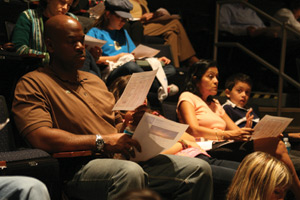Information For Parents
Most parents are surprised to learn that they are the most powerful influence on their children when it comes to drugs. But, it's true, so this message needs to start with parents. Kids need to hear how risky drug and alcohol use can be. They need to know how damaging it can be to their lives. And they need to begin by listening to someone they trust. By staying involved, knowing what their kids are doing, and setting limits with clear rules and consequences, parents can keep their kids drug-free.
Marijuana is the most widely used illicit drug among youth today and is more potent than ever. Children rarely try cocaine, heroin or any other "hard" drugs without first using alcohol, tobacco and/or marijuana.

The Facts
- Forty-five percent of those who begin drinking alcohol before the age of 14 become alcohol dependent at some time in their lives, compared with 10% of those who wait at least until age 21. (Source: Archives of Pediatric & Adolescent Medicine)
- Teens who drink with their parents are more likely to drink more, drink more elsewhere and are more likely to score higher on the measure of “problem drinking” two years later. (Source: Community Anti-Drug Coalitions of America, 2010)
- Every day 2,000 teens in the United States try prescription drugs to get high for the first time. (Source: Partnership for Drug-Free Kids)
- 60% of teens who have abused prescription painkillers did so before age15. (Source: Partnership for Drug-Free Kids)
- 45% of those who use prior to the age of 15 will later develop an addiction. (Source: Misuse of Prescription Drugs. National Surveys on Drug Use and Health, Substance Abuse and Mental Health Services Administration. 2006)
- There are as many new abusers age 12 to 17 of prescription drugs as there are of marijuana. (Source: Partnership for a Drug Free America)
- Marijuana is addictive. More teens are in treatment with a primary diagnosis of marijuana dependence than for all other illicit drugs combined. (Source: Treatment Episodes Data Set (TEDS) 1999-2009, SAMHSA, 2011)
- More than 90% of Americans with a substance problem began smoking, drinking or using other drugs before age 18. (Source: CASA- Columbia)
(View more facts and stats click here)
How Can I Tell If My Child Is Using Drugs?
Physical Evidence of Drug Use
- Liquor missing or watered down
- Fake ID
- Mouthwash, breath spray
- Visine or other eye drops
- Roach clips, rolling papers
- Bong pipes and small screens
- "Stash cans," often disguised as cola or beer cans
- Burning incense, room deodorizers
- Prescription medication disappearing
- Any drugs or drug paraphernalia you find on your child or in your home are indications of drug use, even if he or she insists they "belong to a friend."
Changes in Eating and Sleeping Habits
- Difficulty falling asleep, insomnia
- Inappropriate napping
- Significant weight loss or gain
- Poor appetite
- A sudden appetite (especially for sweets)
- Spends the night in unsupervised homes
Changes in Physical Appearance
- Lack of personal cleanliness, messy appearance
- Red eyes and frequent use of eye drops
- Runny nose, congestion, coughing
- Wearing dark glasses when not necessary
- Pale face, circles under eyes
Changes in Behavior and Personality
- Abrupt changes in mood
- Hostility, defiance of rules
- Depression, "I don't care" attitude
- Lack of responsibility: not doing chores or homework; forgetting family occasions
- Blaming, lying, making excuses
- Loss of memory, shortened attention span, disordered thought patterns
- Withdrawal from family, isolation, secretiveness
Changes in School or Job Performance
- Discipline problems
- Quitting or getting fired from job
- Lowered grades, neglected homework
- Frequent tardiness and absenteeism
- Falling asleep in class
Changes in Friends and Interests
- New or different friends, especially ones who use drugs
- Friends are rarely introduced and seldom come to the house
- More time spent in room or away from home
- Secrecy about actions and possessions
- Hobbies, sports or extra-curricular activities are given up; everything is "boring"
- Stays out past curfew or sneaks out in the night
Positive Attitudes Towards Drugs and Alcohol
- Pro-drug messages on posters or clothing
- Strong defense of the occasional use of drugs by peers
- Thinks adults "hassle" kids
- Easily angered when confronted about chemical use
- Others are concerned over his/her use of alcohol or other drugs

What Should I Do If I Suspect My Child Is On Drugs?
Take Action!
Remember, if your child is using drugs, he/she needs your help. Don't be afraid to be a strong parent! If the problem becomes too much for you to handle alone don't hesitate to seek professional help, such as counseling, a support group or a treatment program.
If you suspect that your child may be using alcohol or drugs, you must share your concerns, with your child. Choose a time when there will be no interruptions. Do not discuss when child is high. Share the previous check list with your child in a straight forward way, and express your concerns. Explain why you are opposed to any drug use and how you intend to enforce that position. Be Understanding, Firm and Supportive.
Talking with your teen about substance abuse is a difficult task for most parents. It's an emotional and frightening subject. Parents often feel that if their teen has a substance problem that it is their fault. Parents may feel that their authority is compromised because they are presently or have in the past struggled with a substance-use problem. Even though this may be the case, parents are still in a better position to understand the causes and consequences of substance misuse than a teen. Parents have a right and obligation to intervene if their child is using drugs or alcohol. You don't have to be perfect to be right.
Prior to sitting down with your teen, make a plan for talking about the main issues and don't lose sight of these issues throughout the discussion. Try to choose a time when the tensions in the house are at a low and when you and your teen have enough time to talk. Then, when you do sit down with your teen, tell them about your concern for their wellbeing. Be genuine and avoid scare tactics.
When you feel that you have laid out the reason for your concern, get your child's point of view. You don't have to agree with them, but listen carefully and try to see the world from their perspective. Try to form a partnership with them for solving the problem. If you are successful, you have taken an important first step toward resolution. Set firm but reasonable rules for your teen that clearly define your expectations and that allow your teen to regain trust and appropriate independence.
Remember that, although parents don't have absolute control over the choices that teens make, parents are never-the-less important resources for providing structure, love and good information for children.
(Source: http://theantidrug.com/ei/conversations_teen.asp)
What Can I Do To Prevent My Children From Using Drugs?
Prevention has been viewed as a school responsibly disregarding the fact that parents, peers, the community and media have important roles to play.
Parents may underestimate the importance of their influence on their children's decisions about drugs. Parents play a crucial part in prevention by setting boundaries and expectations, staying involved and engaging in their children's lives and setting a positive example. The protective factors that may reduce the risk of drug and alcohol involvement are:
Protective Factors
- Strong bonds with family
- Parental involvement
- Clear expectations and consequences
- Positive involvement with social institutions (Faith-based organizations, School, Community)
- Success in school performance
- Perceived external disapproval of drug use
Talk to Your Kids About Drugs
Talk to your child early on about the dangers of drug abuse. Children are exposed to drug and alcohol topics daily, through TV commercials, advertisements and the daily news.
You can tell Your Kids to Say No...Even if you didn't
Many times parents who experimented with marijuana and other drugs in their youth believe that it would be hypocritical if they told their children not to try it.
The decision to tell your children about your own drug use is a personal one; however, parents can tell their kids that much more is known today about the serious health and social consequences of using marijuana and other drugs.
Help Your Kids Turn Down Drugs
- Kids do not usually get drugs from strangers; they get drugs from their friends.
- Teach kids that it is ok to say no to their friends.
- Encourage your child to avoid friendships with kids who use drugs.
- Help your child say "NO" when offered drugs or Alcohol.
Family Time
Getting involved with your child will help you stay connected and ultimately help your child make better decisions. Here are some ways that you can stay involved.
Family Dinners
CA SA research has consistently shown that the more often young people sit down at the dinner table with their families, the less likely they are to smoke, drink or use illegal drugs.
- Teens who eat dinner with their parents twice a week or less are four times more likely to smoke cigarettes, three times more likely to smoke marijuana and nearly twice as likely to drink as those who eat dinner with their parents six or seven times a week.
- Teens from families that almost never eat dinner together are 72 percent likelier than the average teen to use cigarettes, alcohol and drugs, while those from families that almost always eat dinner together are 31 percent less likely than the average teen to engage in these activities.
- Other research has shown that teens who eat frequent family dinners are less likely than other teens to have sex at young ages and get into fights; are at lower risk for thoughts of suicide; and are likelier to do better in school. This is true regardless of a teen's gender, family structure or family socioeconomic level.
- Teens who have frequent family dinners are more likely to be emotionally content, work hard at school and have positive peer relationships. Children and teens that have frequent family dinners also have healthier eating habits.
Make Time for You and Your Child
Plan the date and hold yourself to it!
Praise your child when he has done something good
Too often we are focused on the bad things our kids do, encourage the good behavior.
Thank your child
It can be for a simple task or a large accomplishment it shows that you have taken the time to acknowledge them.
Set Rules and Boundaries
Every child needs boundaries. In order to avoid confusion create rules that you will enforce.
Give Your Child Responsibilities
Assign chores that help the family. Assigning a chore will imply that you are confident that your child will perform responsibly and more adult like, building trust and confidence.
A Note On The 'Net
Just as you monitor where your teens go and with whom they spend their time, you also should monitor their digital activities. Your teen's browsing history, social networking page (such as Facebook), or their email files (as a minor, your Childs privacy is at your discretion), may reveal clues as to whether or not your child is receptive to or using drugs or alcohol.